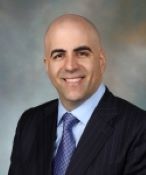 In July, the PNA Spotlight focuses on Dr. Bernard Bendok, a neurosurgeon at the Mayo Clinic in Scottsdale, Arizona. Dr. Bendok earned his M.D. at Northwestern University, Feinberg School of Medicine. He also was an intern and a Resident there. He board certified in Neurological Surgery and specialized in minimally invasive neurosurgery. His PNA directory listing is here. He was kind enough to answer a series of questions from the PNA. His answers follow:
In July, the PNA Spotlight focuses on Dr. Bernard Bendok, a neurosurgeon at the Mayo Clinic in Scottsdale, Arizona. Dr. Bendok earned his M.D. at Northwestern University, Feinberg School of Medicine. He also was an intern and a Resident there. He board certified in Neurological Surgery and specialized in minimally invasive neurosurgery. His PNA directory listing is here. He was kind enough to answer a series of questions from the PNA. His answers follow:
• What inspired you to choose your career path?
In 9th grade I decided to be a doctor after reading about the pituitary gland. I was amazed by how such a small gland could have so much impact on human health and illness. During my undergraduate years I volunteered at a pediatric cancer ward and this experience forever created an impression on me of the power of human empathy and the need to advance the care of patients who suffer from disorders related to the brain and pituitary gland. My love for the anatomy of the nervous system which grew in medical school made me decide that Neurosurgery would be the best way to combine my interests with my life mission to help patients.
• What is the primary focus of your work/research?
My laboratory focuses on three complimentary areas. The first area is anatomic research to enhance surgical planning, decision making, virtual and augmented reality guided surgery, and education, the second is using datascience and artificial intelligence to enhance early disease detection and the third is technology innovation and clinical trials to enhance patient outcomes.
• What do you consider to be the future of your field?
I think that advances in artificial intelligence is going to allow for earlier disease detection which may lead to better outcomes. Advances in intraoperative imaging capabilities and robotics is going to enhance surgical safety and improve outcomes.
• What should patients know about your field/what deserves more recognition/awareness?
I think that patients should seek counsel from experienced centers and pursue second opinions when diagnosed with a pituitary tumor. Its important to note that specialized pituitary imaging may lead to better diagnostic accuracy. Its also important to consider centers where team work between multiple specialities including Neurosurgery, ENT, Ophthalmology, Endocrinology and Neurology is center to the culture.
• What would you like to convey about yourself to your patients?
The pituitary gland is one of the most important structures in the body. I am dedicated with my colleagues to providing exceptional care. I follow the creed of the founders of the Mayo Clinic who stated that “The interest of the patient is the only interest to be considered”.
• Why did you get involved with the PNA; what is the extent of your involvement?
The advocacy and passion the PNA has for patients with pituitary disorders is inspiring and motivates me to do better. The PNA works diligently to connect patients with knowledge and resources for a better life and better outcomes when faced with pituitary disorders.



